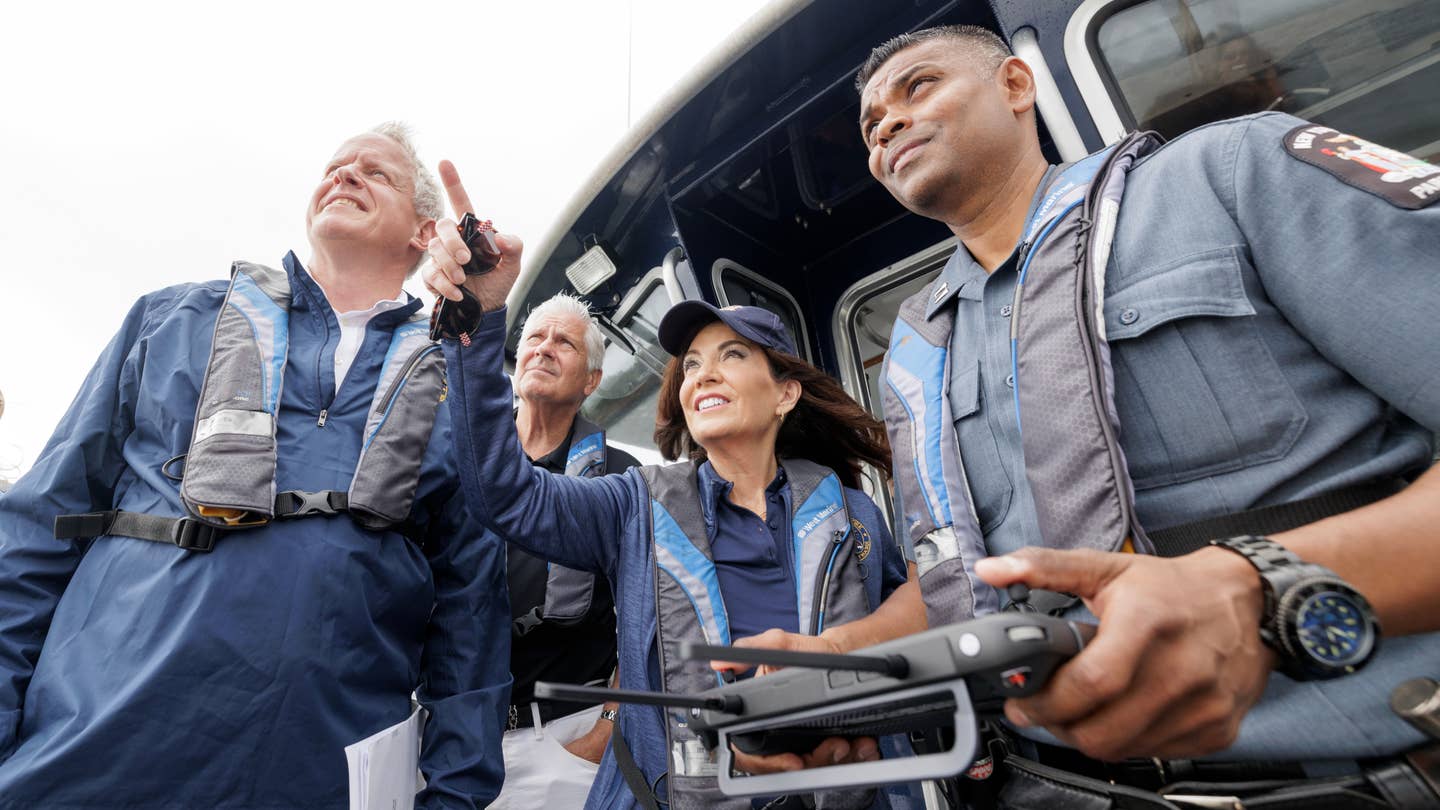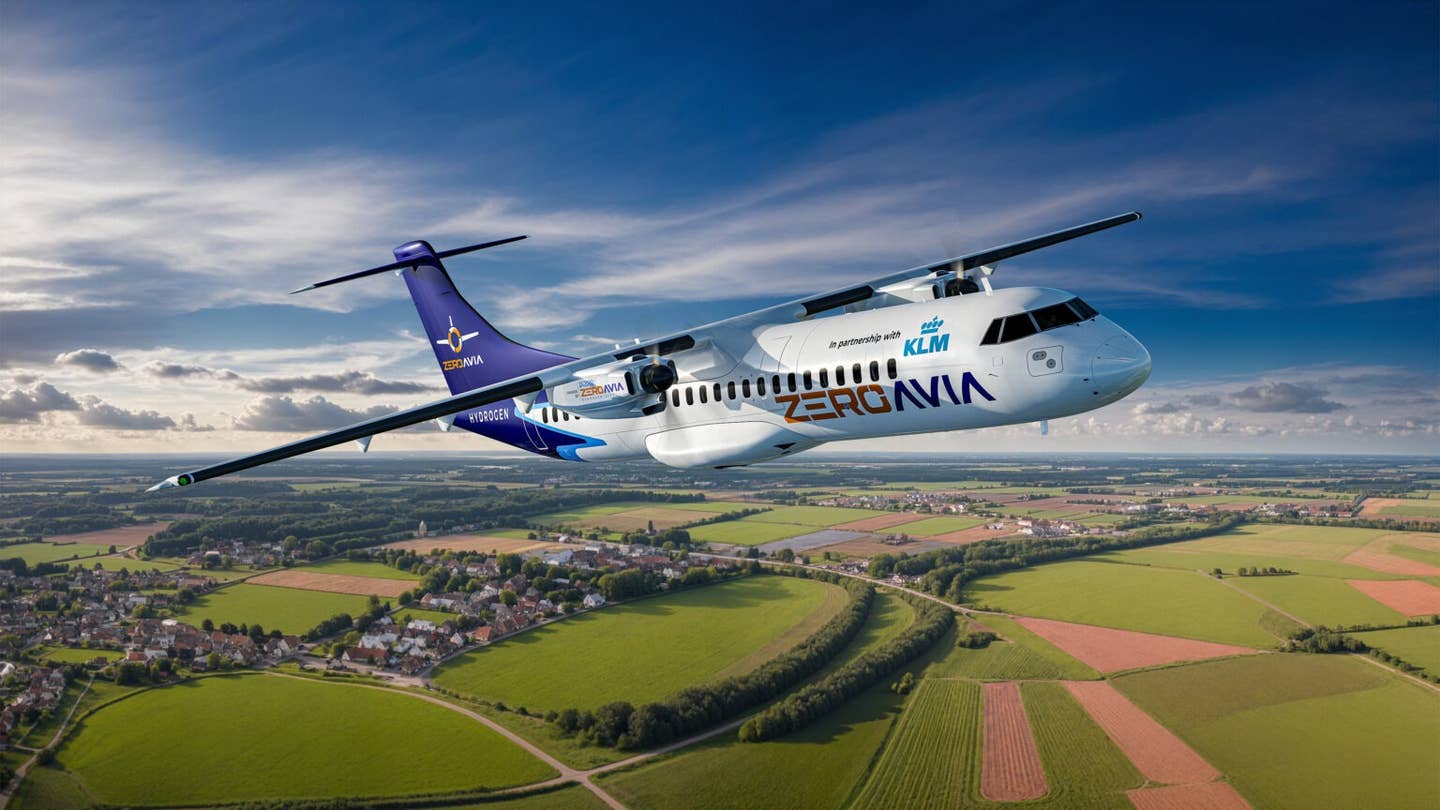New York’s Response to a Flurry of Shark Attacks? Send In the Drones
Following five reported encounters during the July Fourth weekend, New York’s governor rolled out more eyes in the sky.

New York Gov. Kathy Hochul (center) observes park police as they operate a drone over Jones Beach in Nassau County. [Courtesy: Mike Groll/Office of Governor Kathy Hochul]
As New York contends with a flurry of shark attacks—including five in two days over Fourth of July weekend, three fewer than the state recorded in all of 2022—Gov. Kathy Hochul has decided the best way to monitor the sea is from the sky.
It’s possible the rise in shark encounters is simply a fluke: There were actually fewer attacks in 2022 than in the previous year, and the rate of them has remained steady over the past few decades. But on Friday, recognized internationally as Shark Awareness Day, Hochul announced a major expansion of New York’s efforts to combat shark attacks with drones.
The state deployed a small fleet of shark-monitoring drones last summer, expanding it from eight to 18 in May. Now, coastal areas of Long Island, New York City, and Westchester County will have access to as many as 60 drones.
“As beachgoers are enjoying their summer in New York, spending time on some of the most beautiful beaches in the country, we have added this eye in the sky,” Hochul said in a statement. “We have the tools and strategies to monitor marine wildlife and protect the health and safety of New Yorkers. These new drones will allow us to scan the water and help local governments across Long Island and New York City keep local beaches safe for all.”
While none of the shark attacks in New York this year resulted in loss of life or limb, the added surveillance drones so far have helped reduce beachgoers’ fears of a Jaws moment.
“Over the past two seasons, we've learned that drones are the most effective mechanism to detect environmental conditions that could [be attributed] to shark activity,” said Erik Kulleseid, commissioner of the New York State Office of Parks, Recreation, and Historic Preservation—also referred to simply as State Parks.
Last summer, Hochul directed State Parks, the Department of Environmental Conservation, and the New York State Police to begin more rigorous patrolling of coastal areas using drones after the state recorded more confirmed shark attacks than in any year over the previous three decades.
According to Cary Epstein, a lifeguard supervisor at Jones Beach, the aircraft typically make three sweeps per day: one before the beaches open, another sometime during midday, and a third just before close. They’re also deployed following a sighting or attack, patrolling for about an hour while swimmers are asked to stay on the beach.
While in flight, the drones monitor sharks but also schools of fish, seals, and diving birds—some of the toothy predator’s favorite dishes. They also keep an eye out for certain weather conditions that are known to precede sightings and attacks.
Per Hochul’s office, one drone assigned to New York State Park Police is the heavy lifter of the bunch. It’s equipped with thermal imaging and laser range-finding capabilities, as well as high quality cameras to enable surveillance at night or in harsh weather conditions. The drone can also release personal flotation devices in emergency situations, cutting down the time it would take a lifeguard to battle the ocean waves.
Currently, 24 park police officers, State Parks operational staff, lifeguards, and certified drone operators are trained to pilot the shark-monitoring aircraft. While most areas of New York lack drone surveillance capabilities, State Parks is now distributing the aircraft to all downstate municipalities, covering the cost of training and operation. In total, the new initiative will provide up to $1 million in funding for procuring drones and training staff.
So far, the program has received glowing feedback.
“With shark sightings on the rise, these drones will further help us better monitor waters and keep beachgoers safe,” said Oyster Bay Town Supervisor Joseph Saladino. “I thank Governor Hochul for providing these eyes in the sky to local governments throughout the region.”
Added Islip Town Supervisor Angie Carpenter, “These drones will allow town lifeguards and staff to monitor our ocean waters and keep bathers safe, while ensuring they leave with happy memories.”
Town supervisors and executives from Nassau County, Southampton, Hempstead, and Long Beach also lauded the governor’s efforts, praising the ability of drones to complement lifeguards and other safety measures.
Interestingly, New York isn’t the only place drones have been deployed to monitor shark activity. Researchers at California State University-Long Beach’s Shark Lab compiled hundreds of hours of drone footage over 26 California beaches between 2019 and 2022. Their findings, published in June, revealed that humans and sharks share the same waters more often than not—unbeknownst to both swimmers and the animals.
New York, however, appears to be the first state to provide the technology to police and beach staff.

Subscribe to Our Newsletter
Get the latest FLYING stories delivered directly to your inbox






